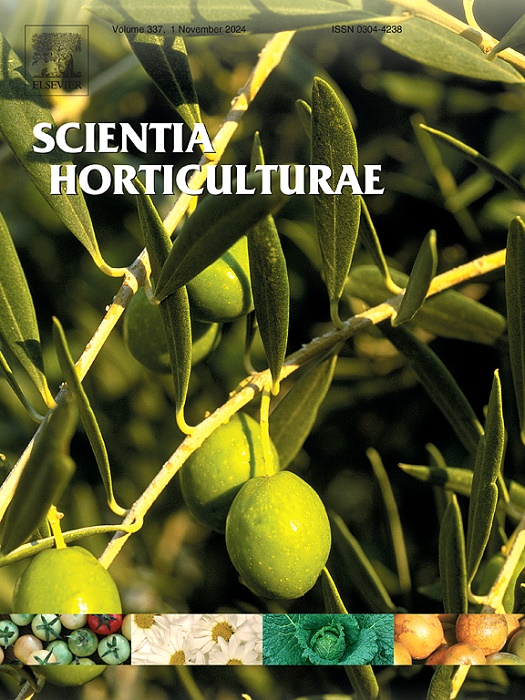Enhancing plant productivity by nature-based solutions: exploring plant growth promoting bacteria (PGPB) application on sterilized and non-sterilized Technosol for urban farming
IF 3.9
2区 农林科学
Q1 HORTICULTURE
引用次数: 0
Abstract
Climate change and urbanization are exacerbating environmental challenges, especially in the Mediterranean region, where soil degradation threats agriculture. Technosols—artificial soils created from organic and mineral waste—offer potential for urban greening and land restoration, but limit plant growth because of nutrient scarcity. This study investigates the use of Plant Growth-Promoting Bacteria (PGPB) to enhance lettuce growth in Technosols.
Plant growth performance was tested in sterile and non-sterile Technosols. Sterilized soil experiments isolated the plant-consortium relationship, avoiding interference from native microbes. Three PGPB inocula were tested: a Technosol-derived consortium (P3), halotolerant Bacillus amyloliquefaciens (RHFS18), and a combination of both (P4). In sterile Technosols, the P3 strain improved leaf traits, water content, and photosynthetic performance.
However, under non-sterile conditions, the benefits due to plant-PGPB relationships were reduced due to competition of PGPB and native microbiome, leading to increased oxidative stress in plants. The P3 treatment demonstrated higher specific leaf area with minimal root infection, while RHFS18 delayed leaf aging, improved water retention, and enhanced photosynthetic efficiency.
These findings highlighted the importance of soil context in optimizing the use of PGPB, offering a Nature-Based Solution for enhancing urban greening and agricultural productivity, utilizing plant-microbe interactions to address nutrient deficiencies in Technosols.

通过基于自然的解决方案提高植物生产力:探索植物生长促进菌(PGPB)在灭菌和非灭菌的Technosol上应用于城市农业
气候变化和城市化加剧了环境挑战,特别是在地中海地区,土壤退化威胁着农业。技术土壤——由有机和矿物废料制成的人工土壤——为城市绿化和土地恢复提供了潜力,但由于养分匮乏,限制了植物的生长。本研究利用植物生长促进菌(Plant growth - promoting Bacteria, PGPB)在Technosols中促进生菜生长。在无菌和非无菌技术溶胶中测试了植物的生长性能。无菌土壤实验分离了植物-财团关系,避免了原生微生物的干扰。试验了三种PGPB疫苗:technosol衍生的联合体(P3),耐盐解淀粉芽孢杆菌(RHFS18),以及两者的组合(P4)。在无菌技术土壤中,P3菌株改善了叶片性状、水分含量和光合性能。然而,在非无菌条件下,由于PGPB和原生微生物组的竞争,植物-PGPB关系带来的益处减少,导致植物氧化应激增加。P3处理表现出更高的比叶面积和最小的根系侵染,而RHFS18处理延缓了叶片老化,改善了保水性,提高了光合效率。这些发现强调了土壤环境对优化PGPB利用的重要性,为提高城市绿化和农业生产力提供了一种基于自然的解决方案,利用植物-微生物相互作用来解决技术土壤中的营养缺乏问题。
本文章由计算机程序翻译,如有差异,请以英文原文为准。
求助全文
约1分钟内获得全文
求助全文
来源期刊

Scientia Horticulturae
农林科学-园艺
CiteScore
8.60
自引率
4.70%
发文量
796
审稿时长
47 days
期刊介绍:
Scientia Horticulturae is an international journal publishing research related to horticultural crops. Articles in the journal deal with open or protected production of vegetables, fruits, edible fungi and ornamentals under temperate, subtropical and tropical conditions. Papers in related areas (biochemistry, micropropagation, soil science, plant breeding, plant physiology, phytopathology, etc.) are considered, if they contain information of direct significance to horticulture. Papers on the technical aspects of horticulture (engineering, crop processing, storage, transport etc.) are accepted for publication only if they relate directly to the living product. In the case of plantation crops, those yielding a product that may be used fresh (e.g. tropical vegetables, citrus, bananas, and other fruits) will be considered, while those papers describing the processing of the product (e.g. rubber, tobacco, and quinine) will not. The scope of the journal includes all horticultural crops but does not include speciality crops such as, medicinal crops or forestry crops, such as bamboo. Basic molecular studies without any direct application in horticulture will not be considered for this journal.
 求助内容:
求助内容: 应助结果提醒方式:
应助结果提醒方式:


